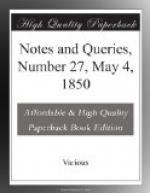A good deal of this is irrelevant to the primary object of my letter; but certainly not altogether irrelevant to the dignity of the highest English representative body of archaeology, the Society of Antiquaries. I hope, at least, that this irrelevancy will give neither pain nor offence to any one, for nothing could be further from my wish or intention than such an effect. I have only wished to illustrate the necessity for an accurate description of what are really the original, subsequent, and present significations of the words “Esquire” and “Gentleman,” and to urge that either some definite rule should be adopted as to their use in official {439} and semi-official cases, or else that they should be discontinued altogether.
BROWN RAPPEE.
April 18.
* * * * *
FIVE QUERIES.
1. Lines by Sir John Suckling.—Is Sir John Suckling, or Owen Feltham, the real author of the poem whose first verse runs thus:
“When, dearest, I but think on thee,
Methinks all things that lovely be
Are present, and my soul delighted;
For beauties that from worth arise,
Are like the grace of deities,
Still present with us though unsighted.”
I find it in the twelfth edition of Feltham’s Works, 1709, p. 593., with the following title:
“This ensuing copy of
the late Printer hath been pleased to
honour, by mistaking it among
those of the most ingenious and
too early lost, Sir John Suckling.”
I find it also in the edition of Suckling’s Works published at Dublin, 1766. As I feel interested in all that relates to Suckling, I shall be glad to have the authorship of this short poem rightly assigned.
2. What is the origin and exact meaning of the phrase “Sleeveless errand”? It is mentioned as late even as the last century, by Swift, in his poem entitled Reasons for not building at Drapier’s Hill:
“Who send my mind as I believe,
less
Than others do on errands sleeveless.”
3. What is the origin and derivation of the word “Trianon,” the name of the two palaces, Le Grand and Le Petit, at Versailles? and why was it applied to them?
4. What is the correct blazon of the arms of Godin; with crest and motto? I have seen an imperfect drawing of the arms, Party per fess, a goblet transpierced with a dagger.
5. Whose is the line,
“With upward finger pointing to the sky.”
I have heard it generally referred to Goldsmith, but cannot find it.
HENRY KERSLEY.
Corpus Christi Hall, Maidstone, April 15. 1850.
* * * * *
QUERIES PROPOSED, NO. I.
The non-appearance of my name as a querist has been rather fortuitous, and it shall now be made evident that I am neither so rich in materials, nor so proud in spirit, as to decline such assistance as may be derived from the information and courtesy of other contributors to the “Notes and Queries.”




